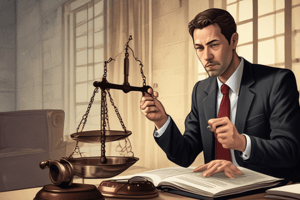Podcast
Questions and Answers
What is the primary characteristic that defines a crime?
What is the primary characteristic that defines a crime?
- Violation of the law and punishable by the state (correct)
- Financially motivated behavior
- Physical harm to individuals
- Violation of social norms and expectations
Which type of crime involves theft, vandalism, or destruction of property?
Which type of crime involves theft, vandalism, or destruction of property?
- Property Crimes (correct)
- White-Collar Crimes
- Public Order Crimes
- Violent Crimes
What theory suggests that crime is a result of social and economic inequality?
What theory suggests that crime is a result of social and economic inequality?
- Biological Theory
- Sociological Theory
- Conflict Theory (correct)
- Psychological Theory
What is the term for intentional violation of social norms and expectations, often in a political or social context?
What is the term for intentional violation of social norms and expectations, often in a political or social context?
What is the primary goal of restorative justice?
What is the primary goal of restorative justice?
What is the term for mechanisms used to regulate behavior and maintain social order?
What is the term for mechanisms used to regulate behavior and maintain social order?
What type of crime is characterized by non-violent, financially motivated behavior?
What type of crime is characterized by non-violent, financially motivated behavior?
What is the term for statistics on crime frequency, often used to evaluate crime trends and policy effectiveness?
What is the term for statistics on crime frequency, often used to evaluate crime trends and policy effectiveness?
Flashcards are hidden until you start studying
Study Notes
Definition of Crime
- Crime: an act or omission that violates the law and is punishable by the state
- Includes acts against people, property, and social order
Types of Crime
- Violent Crimes: physical harm or threat of harm to individuals, e.g., murder, assault, robbery
- Property Crimes: theft, vandalism, or destruction of property, e.g., burglary, larceny
- Public Order Crimes: disruptive or offensive behavior, e.g., disorderly conduct, vagrancy
- White-Collar Crimes: non-violent, financially motivated crimes, e.g., fraud, embezzlement
Theories of Crime Causation
- Biological Theory: genetic predisposition to criminal behavior
- Psychological Theory: mental health issues, personality disorders contribute to criminal behavior
- Sociological Theory: environmental factors, e.g., poverty, family dynamics, contribute to criminal behavior
- Conflict Theory: crime as a result of social and economic inequality
Deviance and Transgression
- Deviance: behavior that violates social norms and expectations
- Transgression: intentional violation of social norms and expectations, often in a political or social context
- Social Control: mechanisms used to regulate behavior and maintain social order, e.g., laws, social norms, stigma
Crime and Society
- Crime Rates: statistics on crime frequency, often used to evaluate crime trends and policy effectiveness
- Crime Prevention: strategies to reduce crime, e.g., community policing, crime prevention through environmental design
- Restorative Justice: approach that focuses on repairing harm and promoting healing, rather than punishment
Definition of Crime
- Crime is an act or omission that violates the law and is punishable by the state
- It includes acts that violate people, property, and social order
Types of Crime
- Violent Crimes: involve physical harm or threat of harm to individuals (e.g., murder, assault, robbery)
- Property Crimes: involve theft, vandalism, or destruction of property (e.g., burglary, larceny)
- Public Order Crimes: involve disruptive or offensive behavior (e.g., disorderly conduct, vagrancy)
- White-Collar Crimes: are non-violent, financially motivated crimes (e.g., fraud, embezzlement)
Theories of Crime Causation
- Biological Theory: suggests genetic predisposition to criminal behavior
- Psychological Theory: suggests mental health issues and personality disorders contribute to criminal behavior
- Sociological Theory: suggests environmental factors (e.g., poverty, family dynamics) contribute to criminal behavior
- Conflict Theory: suggests crime is a result of social and economic inequality
Deviance and Transgression
- Deviance: is behavior that violates social norms and expectations
- Transgression: is the intentional violation of social norms and expectations, often in a political or social context
- Social Control: includes mechanisms used to regulate behavior and maintain social order (e.g., laws, social norms, stigma)
Crime and Society
- Crime Rates: are statistics on crime frequency, used to evaluate crime trends and policy effectiveness
- Crime Prevention: includes strategies to reduce crime (e.g., community policing, crime prevention through environmental design)
- Restorative Justice: is an approach that focuses on repairing harm and promoting healing, rather than punishment
Studying That Suits You
Use AI to generate personalized quizzes and flashcards to suit your learning preferences.




